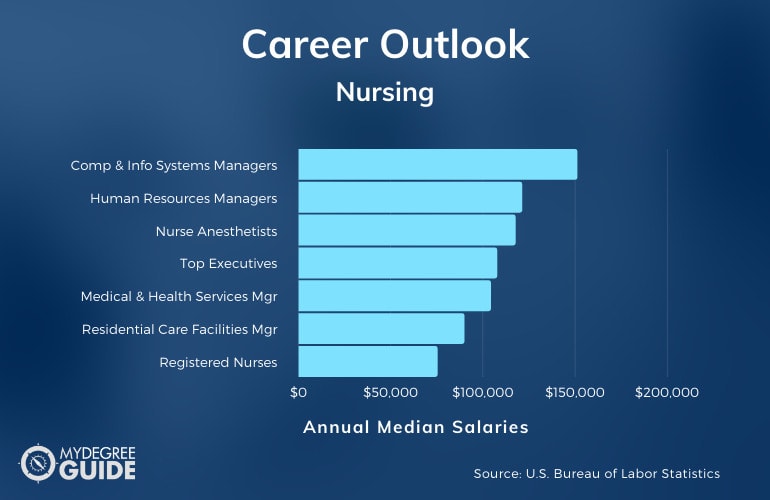With dual MSN MBA programs, nurses can earn two graduate degrees at one time. If you have the drive and ambition to advance to a top leadership role in a healthcare organization, then these two degrees could provide an invaluable foundation.

By studying advanced nursing and business together, you can gain unique insights into heading up healthcare teams.
Editorial Listing ShortCode:
Whether you study online or on campus, a dual MBA and MSN program could help you qualify for a rewarding leadership career.
Universities Offering Online MSN and MBA Dual Degree Programs
Methodology: The following school list is in alphabetical order. To be included, a college or university must be regionally accredited and offer degree programs online or in a hybrid format.
Benedictine University
Benedictine University’s online dual MSN/MBA degree program aims to equip nurses with advanced nursing skills and business management expertise. This comprehensive, fully online program consists of 23 courses and can typically be completed in 4 years. The program’s rigorous curriculum is designed to teach advanced skills for leadership roles in healthcare settings.
Benedictine University is accredited by the Higher Learning Commission.
California University of Pennsylvania
The California University of Pennsylvania offers a dual degree program intended for working nurses. This 100% online program blends instruction in advanced nursing leadership skills with business management acumen. Accredited by ACBSP and CCNE, the program aims to prepare graduates for higher managerial roles in healthcare. The completion of 24 MBA credits and 12 MSN credits is required to graduate.
The California University of Pennsylvania is accredited by the Middle States Commission on Higher Education.
Grand Canyon University
Grand Canyon University’s online MSN-MBA dual degree program focuses on Nursing Leadership in Healthcare Systems. This comprehensive program is designed for experienced nurses, blending advanced nursing leadership with business management skills. The dual degree program spans various courses, including a 16-week practicum, and requires 74 credits for completion.
Grand Canyon University is accredited by the Higher Learning Commission.
Indiana Wesleyan University
Indiana Wesleyan University offers a dual MSN/MBA degree program for experienced nurses seeking to elevate their leadership and business acumen in healthcare. This online program merges nursing leadership with business management in a faith-based curriculum. It requires the completion of 61 credit hours and is part of IWU’s suite of health systems leadership programs.
Indiana Wesleyan University is accredited by The Higher Learning Commission.
Jacksonville University
Jacksonville University’s dual MSN/MBA program integrates nursing and business administration for executive-level careers. It requires the completion of 60 credits across the Keigwin School of Nursing and the Davis College of Business & Technology. Designed for flexibility, the program aims to accommodate professionals seeking advanced roles in healthcare management and can typically be completed in 3 years.
Jacksonville University is accredited by the Southern Association of Colleges and Schools Commission on Colleges.
Johns Hopkins University
Johns Hopkins University’s MSN/MBA program is focused on Healthcare Organizational Leadership. This challenging online program requires the completion of 65 credits and 504 clinical hours. The curriculum blends advanced instruction in nursing leadership with robust business education. The program offers both synchronous and asynchronous learning environments, preparing for high-impact roles in healthcare management.
The Johns Hopkins University is accredited by the Middle States Commission on Higher Education.
Liberty University
Liberty University’s online MSN/MBA dual degree program is designed to integrate advanced nursing skills with comprehensive business management education. Accredited by the CCNE, the program is 100% online and requires the completion of 60 credit hours. The program can typically be completed in about 2.5 years. There is no practicum requirement, allowing for a fully remote learning experience.
Liberty University is accredited by the Southern Association of Colleges and Schools Commission on Colleges.
University of Mary
The University of Mary’s online MSN/MBA dual degree program in Health Care Administration is designed for nurses seeking leadership roles. This program, delivered entirely online, teaches conflict resolution, leadership skills, and ethical practices in healthcare. It typically requires less than 2.5 years to complete and covers advanced healthcare management and business topics without a practicum component.
The University of Mary is accredited by The Higher Learning Commission.
University of Texas – Tyler
The University of Texas at Tyler offers a coordinated MSN-MBA online program. This dual degree program is structured to be completed fully online and requires the completion of 63 credit hours to graduate. It can typically be finished in 2 to 3 years. The curriculum is designed to help students gain skills in both advanced nursing practices and business management to enhance their leadership capabilities in healthcare settings.
UT Tyler is accredited by the Southern Association of Colleges and Schools Commission on Colleges.
West Virginia University
West Virginia University offers a dual Master of Science in Nursing (Executive Focus) and MBA program. This integrated dual-degree offering combines instruction in nursing leadership with business administration skills. This program is designed for part-time study, allowing students to progress at a flexible pace, typically completing the program in about 3 years.
West Virginia University is accredited by the Higher Learning Commission.
MSN & MBA Dual Degree Programs

Nurses often focus on delivering high-quality care to patients, and healthcare business leaders tend to look at the bottom line. There can be wide gaps between what the two groups feel is best.
By earning a dual graduate degree in both nursing and business, you can learn to view situations from both perspectives and to develop solutions that balance the two sides.
A dual MSN MBA degree can equip you with a unique skill set that may help you advance to top leadership roles in various health-related organizations. Earning the two degrees simultaneously can save you valuable time compared to pursuing each program separately.
Some schools offer both online and on-campus program options and some even offer online accelerated nursing degree programs combined with a business degree.
Master of Science in Nursing

An M.S.N., or a Master of Science in Nursing, is a graduate degree for those who aspire to advanced leadership roles in nursing. To join an MSN program, students usually need to be registered nurses who have already earned their Bachelor of Science in Nursing (BSN).
Some MSN students pursue clinical specializations so they can deliver more comprehensive patient care. Others pursue executive studies so they can be good candidates for leadership roles in healthcare organizations. For a dual MBA MSN program, you’re more likely to focus your nursing studies around executive leadership.
Topics covered in this program can include:
- Informatics
- Healthcare budgeting
- Healthcare research
- Models of healthcare delivery
- Nursing administration
- Public health
To sum up your nursing studies, there may be a capstone course.
Master of Business Administration

An M.B.A., or a Master of Business Administration, is an advanced degree for business professionals or those who wish to enter the business world.
Some people begin an MBA program after getting an undergraduate degree or gaining professional experience in the business world. For others, this graduate degree is an initial step toward a business career.
Getting an MBA can increase your leadership potential. Knowing how to deliver excellent patient care is an important aspect of being a healthcare executive, but understanding business concepts is critical, too.
Topics that you’ll study for an MBA might include:
- Accounting
- Finance
- Human resources
- Information technology
- Management skills
- Organizational structure
In your MBA capstone class, you might develop a practical solution for solving a business problem.
Nursing Careers & Salaries

Most graduates of this dual MBA program pursue leadership roles related to the business side of healthcare.
Many end up in the field of medical and health services management. That category may include job titles like healthcare administrator, patient services director, or health operations manager. Some professionals work in compliance departments.
Nursing home administration is a subset of the health services management field. To hold the top spot in a nursing home, it’s necessary to be licensed. Depending on your specialization during your MSN MBA program, you may be equipped for more specific roles within the healthcare field.
For example, you might be interested in heading up the human resources services for the nursing department of a large healthcare organization. If you studied informatics, you could look for jobs in medical records or information systems.
According to the Bureau of Labor Statistics, management occupations pay a median annual salary of $109,760.
| Careers | Annual Median Salaries |
| Computer and Information Systems Managers | $151,150 |
| Human Resources Managers | $121,220 |
| Nurse Anesthetists, Nurse Midwives, and Nurse Practitioners | $117,670 |
| Top Executives | $107,680 |
| Medical and Health Services Managers | $104,280 |
| Nursing and Residential Care Facilities Managers | $89,880 |
| Registered Nurses | $75,330 |
| Compliance Officers | $71,100 |
| Social and Community Service Managers | $69,600 |
| Medical Records and Health Information Specialists | $44,090 |
An MSN is the typical education requirement for becoming an advanced practice registered nurse (APRN), such as a nurse practitioner. An MSN MBA program, though, is more often focused on business aspects than an APRN specialization.
To qualify for licensure, you’d need to take courses specific to your area of APRN specialty. An MSN MBA program could possibly help you get there, but its focus is more on business leadership in nursing settings.
Your healthcare and business background might prepare you for leadership roles in various community organizations. These could include drug rehabilitation facilities or programs that provide food to people in need.

You might also be able to work in a consulting role. Consultants can provide health-related information to government agencies or insurance companies. Your qualifications might also help you pursue a job in health policymaking.
Some nursing leaders advance to executive positions. One example is working as a chief nursing officer (CNO). Another is being the chief executive officer (CEO) of a health services company.
MSN-MBA Curriculum & Courses
For a dual masters degree, you’ll have both a nursing core and a business core to complete.
- Advanced Human Resources: You’ll learn to make the most of your organization’s human capital by creating a positive work environment and encouraging employee development.
- Advanced Nursing Practice: This course will equip you with skills for emerging as a leader in your field, and it will also introduce you to various leadership roles that you might be able to hold.
- Health Research: In one or more graduate courses, you’ll learn to interpret statistical data and read scientific reports, and you’ll also discuss how research informs evidence-based practices.
- Healthcare Finance: In this class, you’ll discuss strategies for staying within your organization’s budget without compromising on delivering high-quality care.
- Healthcare Law and Ethics: You may analyze case studies to help you better understand the impact of legalities and ethical decision-making on patients, families, and healthcare organizations.
- Management Capstone: You may wrap up your business studies with a major capstone project that involves developing a strategic plan for addressing a real-world business problem.
- Marketing Principles: You’ll explore topics like consumer behavior, pricing strategies, and advertising in this class so that you’ll better understand how to grow your brand and sell more services.
- Nurse Informatics: You will become more familiar with technology platforms used for collecting healthcare data and improving patient experiences.
- Organizational Structure: This course will explore various theories about organizational structure and discuss how those ideas are implemented in real-world scenarios.
- Public Health and Epidemiology: You’ll study disease trends, health promotion, and equitable access to care in a course on public health.
Some MSN MBA dual degree online programs include about 65 credit hours worth of coursework. Others involve nearly 90 credit hours.
Dual Masters Admissions Requirements

MSN MBA online programs can be rigorous, much like dual MPH MBA programs online for those interested in combined public health and business degrees. So schools are often selective about their admissions policies. You may have to meet several qualifications before you’ll be considered for a spot.
Requirements can include:
- Bachelor of Science in Nursing
- Recommendations from professional or academic supervisors
- State nursing license
- Work experience
Submitting transcripts and a resume can show your academic and work history. Some schools also request GRE or GMAT scores, though there are universities that offer direct entry MSN programs without GRE requirements. You may need to write a statement about your goals as well.
Accreditation

Getting two degrees is a great accomplishment, but it will be the most meaningful if they come from an accredited school. Regionally accredited colleges are considered the gold standard. Accredited institutions have worked hard to pass a rigorous evaluation process by a regional accrediting agency.
The credits that you earn from an accredited school will be more highly regarded by other colleges. If you want to transfer elsewhere or get into a doctoral program, for example, either on-campus or online MSN to DNP programs that some universities offer, starting your graduate studies at a regionally accredited school may make all the difference. Accredited degrees are also widely respected by potential employers.
Financial Aid and Scholarships

A dual degree may sound expensive at first, but financial aid can help make this a more attainable goal. For your first step, you can fill out the Free Application for Federal Student Aid (FAFSA).
Government student aid may include grants or loans. In addition to federal programs, many states have assistance programs as well. In general, graduate students are more likely to get loans than grants. Options vary from state to state, though, so it can be beneficial to check out all avenues that are available to you.
Scholarships and fellowships are other ways to earn financial assistance. Your school might have scholarships that are designated for students getting MBAs or MSNs. Other private and public organizations run scholarship programs as well.
Earning graduate degrees could also be of benefit to the healthcare organization where you work. Depending on where you work, you might be able to ask your employer to cover part of the cost.
MSN or MBA, Which Is Better?

If you have to pick between one degree or the other, which should you pick? Either can be a strategic choice, so it can be helpful to consider your career goals when trying to decide.
For an MSN, you’ll learn to:
- Evaluate community health needs
- Head up nursing teams
- Strive for quality patient care
MBA students learn to:
- Lead decision-making processes
- Oversee budgets
- Solve healthcare business problems
With an MSN, you could opt for a concentration in executive leadership. With an MBA, you could pursue an MBA in Nursing or in a related specialization, such as healthcare administration.
What Is an MSN MBA Dual Degree?

An MSN MBA dual degree is a graduate-level program in which you’ll earn both a Master of Science in Nursing and a Master of Business Administration. Together, these two degrees offer a solid foundation for a career in healthcare leadership.
For your nursing program, you’ll likely study healthcare ethics, models of healthcare service, advanced practice nursing roles, and global health. For your business studies, you’ll typically study accounting, finance, economics, information technology, and operational management.
What Can I Do with an MBA and MSN Dual Degree?
Students with an MBA and MSN dual degree tend to pursue careers in medical and health services management.
According to the Bureau of Labor Statistics, medical and health services managers earn between $59,980 and $195,630 annually. Common employment settings include hospitals, doctor’s offices, and government agencies.
Those who study informatics in grad school may work as information systems or medical records managers. Professionals in the field with dual MSN MBA degrees may also end up in executive roles, such as chief nursing officers or CEOs. The median annual pay for chief executives is $185,950.
MSN & MBA Dual Degree, How Long Will It Take?
A standard 36 credit hour master’s program that doesn’t include a thesis requirement can usually be completed in 1 full year, including the summer. Part-time enrollment or a thesis requirement can extend your timeline.
Of course, it takes longer to earn two degrees at once. Because MSN/MBA programs usually require 65 to 90 credit hours, it generally takes between 2.5 years and 3 years of full-time study to complete them.
Is a Dual MSN MBA Worth It?

Yes, a dual MSN MBA is worth it for many students. Through this two-degree approach to graduate studies, you can gain a well-rounded understanding of what it takes to lead health organizations.
Your MSN healthcare background can enhance your knowledge of patient care, and your business studies can help you manage budgetary, staffing, and stakeholder needs.
Plus, medical and health services management is an exploding field. According to the Bureau of Labor Statistics, jobs for medical and health services managers are expected to grow at a noteworthy 32%—well above the national average—over the next decade.
Getting Your MSN/MBA Dual Degree Online

Within 2 to 3 years, you could potentially have two master’s degrees in hand. Together, a Master of Science in Nursing and a Master of Business Administration can help position you as a qualified candidate for healthcare leadership roles.
Getting two separate degrees could take several years, but pursuing a dual program can help speed up the process. If you want to make it even easier to fit graduate studies into your life, you may want to consider online learning options, such as earning a nursing masters combined with a business degree online.
Now may be the time to explore accredited MBA MSN dual degree programs online.
